Dentures – Melbourne, FL
Complete Your Smile with Dentures
Tooth loss is a very common occurrence. In fact, at least 35 million Americans have lost all their teeth. Whether they are missing as the result of an accident, injury, disease, or another factor, your quality of life doesn’t need to suffer. Dr. Chenet makes custom dentures in Melbourne that fit comfortably and look natural. You can eat, smile, and speak with confidence knowing your dentures closely replicate your natural teeth.
Who’s a Good Candidate for Dentures?

Normally, it doesn’t take much to qualify for dentures. You generally just need prior tooth loss and decent oral health. As such, the number of teeth lost shouldn’t matter. Still, the only way to know if you’re a good denture candidate is to consult Dr. Chenet. He and his team will assess whether dentures work for you. If you’d like to learn more about this vetting, we’d be happy to explain. Just keep reading or book a consultation visit with us.
Effects of Missing Teeth

Before anything else, reviewing the causes and effects of tooth loss is helpful. This approach lets you see how dentures could protect your health.
In terms of causes, people lose teeth for various reasons. Someone might contract gum disease, which wears down the bone and tissue securing their chompers. Similarly, a tooth can decay so much that it falls out or needs extraction. You might even get your teeth knocked out due to an accident.
Meanwhile, the effects of tooth loss are severe but consistent. For starters, going without teeth almost always makes eating, speaking, and smiling harder. Untreated smile gaps will also degrade your jaw, causing it to sag. That latter process could then trigger a facial collapse. Even worse, the same gaps might result in yet more tooth loss.
What Qualifies You for Dentures?
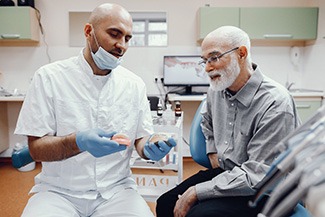
Patients can typically qualify for dentures if they lack teeth. There are other factors, though, you ought to consider.
Just look at oral health, for example. Dentures aren’t just effective at replacing missing teeth; they can also replace sensitive or decaying ones. Furthermore, patients with gum disease won’t benefit from dentures. After all, inflamed or eroded gum tissue can’t support these restorations. Consequently, the ideal candidate must commit to dental care.
The number of teeth lost is also a relevant matter. You’ll need one of two possible denture types based on how many are gone. The first, a partial denture, is best for replacing a few teeth. On the other hand, a full kind is best when all chompers along an arch are gone.
Finally, finances also play a role in denture candidacy. You naturally can’t get treatment if you can’t afford it. Thankfully, however, dentures are cheaper than other restorations. The result is that they’re ideal for patients on a budget.
Alternative Tooth-Replacement Options
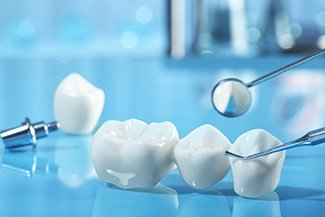
It’s not the end of the world if you aren’t a good denture candidate. Our office has other restoration services available. In fact, Dr. Chenet and his team have two other tooth-replacement options to try. They are:
- Dental Implants – Unique among restorations, dental implants are prosthetics placed in your jawbone. They gradually fuse with your jaw due to their titanium composition. Said fusion makes them secure, permanent, and pricey compared to alternative options.
- Implant Dentures – Unlike common ones, implant dentures rely on dental implants for stability. As such, they don’t slip or fall over time. (These dentures can also be permanent or removable.)
How Dentures are Made

Before you actually get dentures, maybe you want to learn how they’re made. Fair enough – it’s helpful to know what went into your new teeth. However, you likely aren’t sure where to get the facts; denture creation isn’t a well-known topic. In that case, our office is ready to help: listed below is a primer on how dentures are made. Reading it will help you understand the prosthetic teeth. Should you want more details, though, please call our office.
What are Dentures Made Of?

Full or partial, every denture has two core parts: the base and the artificial teeth. These components ensure the prosthetic works well. As for the proof, consider the features below:
- Denture Base – A denture’s base is its foundation, holding the artificial teeth. It’s colored pink to blend in with the gums it sits on. In terms of material, the base can use acrylic, nylon, porcelain, or even actual metal. (Which one a denture uses is determined by its type.)
- Artificial Teeth – Put simply, the artificial teeth are a dentures' toothy portions. Dental labs make them from tooth-colored resin or porcelain. (Today, porcelain is the more popular substance; it seems more toothlike than resin.)
The Denture Creation Process
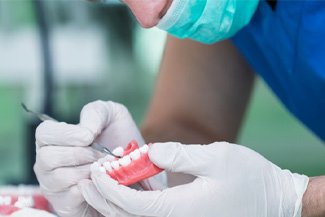
Dentures aren’t genetic or one-size-fits-all. Instead, a dentist customizes each one for a patient’s mouth. The creation process thus involves a unique, multi-step process. Such steps are the following:
- Step 1 : Our dentists will take a dental impression. From there, they’ll make a plaster model that matches the final denture’s size and shape.
- Step 2 : The plaster model is sent to a lab that makes dentures. Lab technicians will then create a wax gum line by using it.
- Step 3 : The lab will set artificial teeth in the wax base. The resulting prototype will be used for your finished dentures.
- Step 4 : The wax dentures will go to our dentists for a fitting. Once tested, they’ll be returned to the dental lab to complete the final restorations.
- Step 5 : A worker will boil the dentures to remove their wax. They’ll then place the prosthetics in a flask. Said flask will receive plaster and sit in hot water.
- Step 6 : A separator will go into the plaster layer, preventing the acrylic from sticking. This acrylic will be injected into the flask to replace the wax.
- Step 7 : The plaster will be removed to reveal the dentures. The restorations will then be placed in a bath to remove their residue.
- Step 8 : Excess acrylic will be cut from the denture. Said denture will then be polished.
- Step 9 : The patient will have the dentures fitted. At that time, the dentist will adjust your denture to work smoothly.
Adjusting to Your New Dentures

Naturally, you may feel aches when first wearing dentures. Some patients even suffer soreness and struggle to eat or speak. Still, never fear; these effects are typical. They’ll slowly fade as you adjust to the dentures. Once you have, the new teeth should feel quite natural.
Of course, you can speed up the adjustment. One way is to eat soft foods for a week, which won’t irritate your gums. Similar approaches include working your facial muscles or applying adhesives. With these actions, your pain will ease, and the denture will seem more familiar.
If your pain lasts a while or worsens, call us at once. Your dentures may need to be repaired or replaced.
What are Dentures?

Dentures are the most traditional treatment to replace several or all your missing teeth. Custom-made prosthetic teeth are attached to a gum-colored base that’s held in place using one of many methods, such as an adhesive. Although they have a bad reputation for being bulky or looking fake, they are now more realistic than ever before. Dr. Chenet uses the latest innovations in dentistry to ensure a comfortable, functional, and natural-looking denture.
What are My Options?

Dr. Chenet will discuss your options in great detail. After a personal consultation, he’ll guide you to the appropriate solution depending on your circumstances, which may include:
- Partial Denture: If you still have a couple of natural teeth, you may be a candidate for a partial denture, which is designed to fill the empty spaces in your smile. The gum-colored base is attached to a metal framework. This allows it to clip or clasp onto your remaining teeth.
- Full Denture: Chenet takes an impression of your mouth to create an acrylic base to hold your replacement teeth. It’s held to your gum tissue using suction or an adhesive.
- Implant-Supported Denture: Dental implants are strategically placed into your jawbone to secure your denture. You’ll never need to worry about any slipping or irritation.
Benefits of Dentures

When you are missing multiple teeth, it can be challenging to complete tasks that you once thought were easy. This includes chewing your food, speaking clearly, and smiling with confidence. Fortunately, dentures are available to transform the lives of people who are missing several, most of, or all of their teeth. If you have suffered from tooth loss, here are some of the benefits you could experience if you opt for dentures.
Psychological Benefits

Edentulous people, or people without teeth, often have difficulty accepting their tooth loss. This can have a huge impact on self-esteem and social life and even increase the risk of experiencing depression. By restoring the appearance and function of your smile, you are more likely to experience improved confidence and self-esteem. Dentures can also reduce anxieties related to appearance, speech articulation, chewing ability, and more!
Clearer Enunciation

When your smile isn’t complete, it can be much more difficult to speak. To pronounce and perform words, it’s important that your lips and tongue are positioned properly. When you are unable to touch your tongue to your teeth, some words are very difficult to say. Dentures help by acting as your missing teeth, therefore allowing you to enunciate more clearly while you speak. After a short adjustment period and some practice, speaking will come naturally.
Improves Nutrition

Many foods that are good for you are tough in texture, like certain vegetables, fruits, and healthy proteins. When you can’t chew your food thoroughly due to missing teeth, you can experience issues like indigestion and malnutrition. With dentures, you can enjoy a more expansive diet full of nutritious foods to stay healthy. Ultimately, dentures can help you receive the essential vitamin and minerals you need to thrive.
Preserves Oral Health

If you still have some remaining teeth in your mouth, dentures can keep them from shifting around to fill in the gaps left behind by your missing teeth. Dentures can also help to keep some of the weight of chewing, therefore reducing the wear and tear of your existing teeth.
Expands Opportunity

Your smile is one of the very first things that people notice about you. When it comes to job interviews, sales, and promotions, it is crucial that you make a great first impression, and a complete smile is an advantage. When you feel more confident about the appearance of your smile, it will show in the way you present yourself. This means that you could experience additional opportunities in your personal and professional life!
Understanding the Cost of Dentures

Dentures can vary in cost depending on a few key factors based on your needs. No matter what type of denture you need or the level of tooth loss you’re trying to resolve, our dentists are happy to speak with you directly to not only meet your dental concerns, but your budget as well. Read on to learn more about the most important factors that affect the cost of dentures in Viera and more.
Factors That Affect the Cost of Dentures
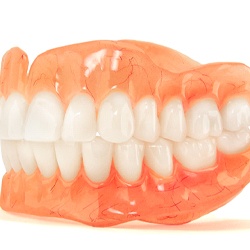
While there are many factors that can impact the cost of dentures, some of the most notable include:
- Preparations needed before dentures can be worn (i.e. decay removal, gum disease therapy, extraction of existing teeth, etc.)
- Acrylics used to create the gum-colored base of the denture (for the best esthetics possible, you’ll need to pay more)
- Materials used to create the replacement teeth (typically made from either acrylic or porcelain)
If you want your denture to be as durable and lifelike as possible, you’ll need to cover higher costs. However, thinking of dentures as a long-term investment is worth considering as you’ll be wearing it inside your mouth for most of the day!
Are Implant Dentures More Expensive?
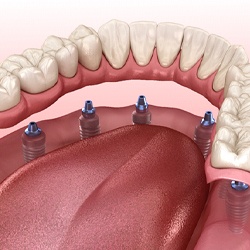
Generally, implant dentures are going to be more expensive because they require the surgical placement of dental implants beforehand. An implant denture attaches to a series of dental implants, which are essentially titanium post designed to mimic tooth roots. This means your denture can be more permanent, natural-feeling, and more comfortable to use. It also means you won’t have to worry about a shifting denture or making changes in your diet to accommodate them. While they can be far more expensive, most people seem them as an investment in their long-term oral health worth making.
Does Dental Insurance Cover Dentures?
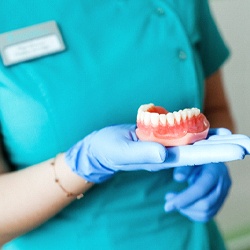
Dentures are a major dental treatment according to most dental insurers, which means you can expect their plans to offer some level of coverage for your tooth replacement. In most cases, they provide up to 50% coverage. However, this largely depends on the plan you have. While they are likely to be covered, it’s not guaranteed. Our team members would be happy to help you maximize any benefits that you have before you begin your treatment plan.
Other Options for Making Dentures Affordable

If you don’t have a dental insurance plan to rely on, you can take advantage of other financing options to pay for your denture. For example, it’s common for patients to enroll into a third-party financing plan from CareCredit, especially if they’re considering implant dentures. This allows you to make payments on dental services over a longer period of time with little to no interest attached.
Alternatively, you can explore our in-house dental savings plan to get discounts not only on preventive services, but restorative treatments as well!
If you’d like to learn more about your financing options to pay for dentures, please give our office a call to schedule a consultation.
Dentures FAQs
How Long Will You Have to Wait to Get Dentures After Your Teeth are Pulled?
The average wait time to receive a denture after teeth are extracted is around six to eight weeks. However, this time period can vary based on the type of denture you’re receiving. We recommend this wait time because we want to ensure the gums have a chance to heal fully as well as make sure the denture fits properly. If you plan to get an implant denture, you will need to wait about four to six months for your implants to fuse with your jawbone tissue before receiving a prosthetic.
Can I Sleep with My Dentures?
Before you go to bed, you should remove your denture. The only exception to this rule is when you first receive it. You’ll be asked to wear it for about 24 hours. After that initial period, you’ll need to take it out every evening because it can restrict the circulation in your gums. This can cause soft tissue irritation and even speed up the resorption of the ridge. By taking them out, you give your gums a chance to recover and absorb the nutrients they need at night. Additionally, the dark space underneath the dentures is an ideal area for bacteria to thrive. It’s one of the reasons why sleeping with dentures has been associated with conditions like pneumonia. You can also develop higher levels of gum and tongue plaque when wearing your denture for too long.
Is It Hard to Talk with Dentures?
It will take a few days for you to adjust to your dentures since you are likely so used to speaking with your natural teeth. The exact amount of time it will take depends on the type of denture you receive and varies from person to person. To make the transition easier, it’s best to wear your dentures as much as possible to practice speaking, chewing, and smiling. This should make the adjustment process go by faster.
Speak slowly to start as fast speech can come out muffled if you’re not used to wearing a denture. It’s common to lisp with dentures at first due to changes in your palate. After you correct these changes, it should slowly disappear. Try to bite down and swallow before you talk if your dentures begin to shift while you speak. This will help keep them in their correct position.
Dr. Chenet recommends you stick to softer foods until you adjust to your dentures. Don’t forget to take the time to care for your new smile every day to ensure it lasts for many years.
Schedule Your Consultation
Although dentures will never replace your original teeth, you can enjoy a more active, healthy, and confident lifestyle by treating your tooth loss. Contact our office today to schedule your consultation for a complete smile.
